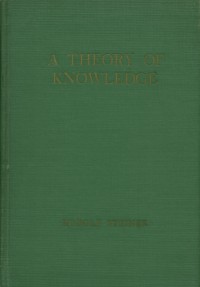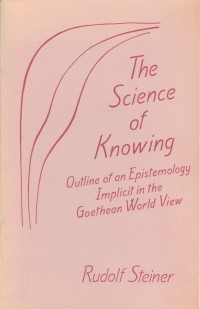A Theory of Knowledge
GA 2
The basis of a theory of the Goethean world view, with special reference to Schiller, as well as an addition to Goethe's “Scientific Writings” in Kürschner's “German National Literature.” Almost forty years after his early works on this subject, Rudolf Steiner wrote: “By putting this before me again today, it appears to be the epistemological foundation and justification of all that I published later. It speaks of a way of perceiving that opens the physically apparent world into the spiritual/intellectual.” Originally published in German as, Grundlinien Einer Erkenntnistheorie der Goetheschen Weltanschauung mit besonderer Ruecksicht auf Schiller. Zugleich eine Zugabe zu Goethes “Naturwissenschaftlichen Schriften“ in Kuerschners “Deutsche National-Litteratur.“
A Theory of Knowledge (1940)

This book first appeared in 1886. In it, Steiner approaches the epistemological question, “How Does One Know?” His point of departure is the more-or-less unexpressed epistemology of Goethe in his scientific writings and elsewhere. This is a good introduction to Goethe's methodology. This First English Edition was designed by Peter Döblin, and translated by Olin D. Wannamaker.
The Science of Knowing (1988)

This edition of The Science of Knowing is a new translation of Grundlinien einer Erkenntnistheorie der Goetheschen Weltanschauung mit besonderer Rücksicht auf Schiller (Bibliographie No. 2), 7th edition GAS 1979, published by the Rudolf Steiner Nachlassverwaltung, Dornach, Switzerland. This translation, from the original German, is by William Lindeman. A prior translation is available under the title A Theory of Knowledge, published by the Anthroposophic Press.
Grundlinien einer Erkenntnistheorie der Goetheschen Weltanschauung, mit besonderer Rücksicht auf Schiller

Zu dieser seiner frühen Schrift schreibt Rudolf Steiner fast vierzig Jahre nach ihrem Entstehen folgendes: «Indem ich sie heute wieder vor mich hinstelle, erscheint sie mir auch als die erkenntnistheoretische Grundlegung und Rechtfertigung von alle dem, was ich später gesagt und veröffentlicht habe. Sie spricht von einem Weg des Erkennens, das den Weg freilegt von der sinnenfälligen Welt in die geistige hinein.»

